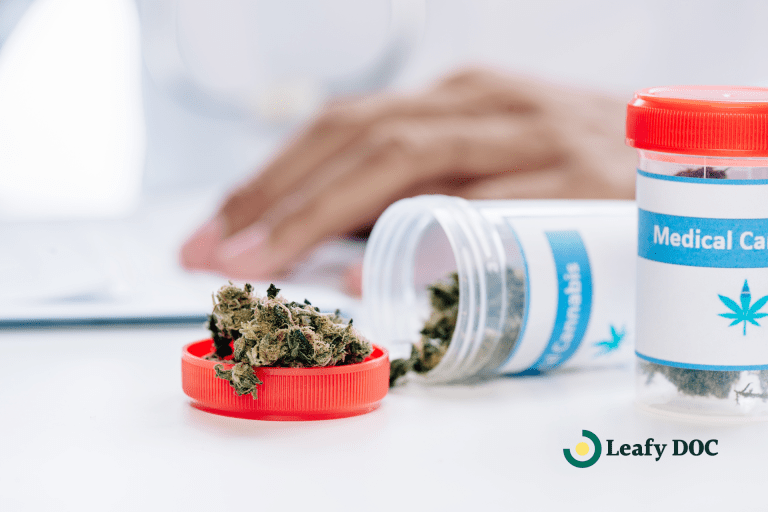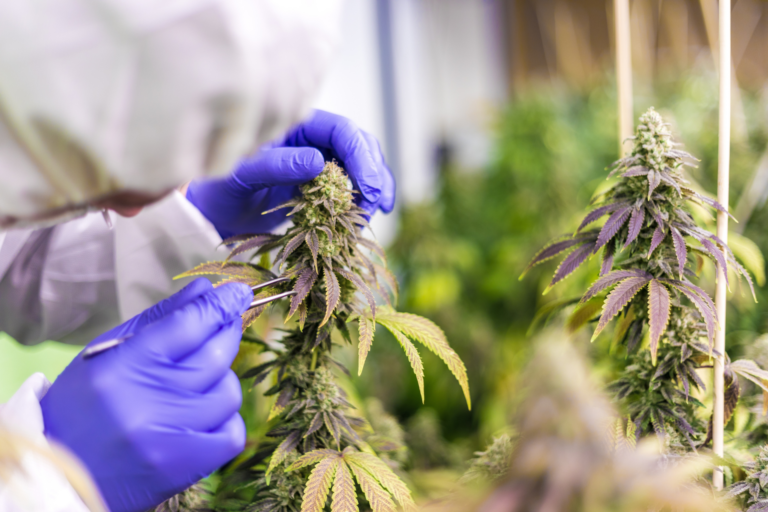Exploring The Possible Interactions Of Medical Marijuana With Medications
by Haley Mills · June 12, 2024
Unlock the potential of medical marijuana! Learn about its interactions with medications and discover new alternative treatments. Click here to explore this fascinating topic now.

As the use of medical marijuana becomes more prevalent, it is essential to understand how it may interact with other medications you may be taking. In this article, we will explore the pharmacology of medical marijuana and its possible interactions with medications, giving you the knowledge and freedom to make informed decisions about your healthcare.
Medical marijuana contains various compounds, such as THC and CBD, which interact with the body’s endocannabinoid system. This system plays a crucial role in regulating various physiological processes, including pain sensation, appetite, and immune response.
When it comes to medications, there is a possibility of interactions with medical marijuana due to the shared metabolic pathways in the liver. Understanding these potential interactions is vital for individuals who are considering or already using medical marijuana alongside their current medication regimen.
In the following paragraphs, we will delve into the potential drug interactions with medical marijuana, the impact it may have on liver enzymes, and provide recommendations for patients using medical marijuana and medications. By exploring these topics, we aim to empower you with the knowledge you need to navigate your healthcare choices confidently.
Key Takeaways
- Medical marijuana interacts with the body’s endocannabinoid system and shares metabolic pathways in the liver with other medications.
- THC in medical marijuana inhibits liver enzymes responsible for metabolizing certain drugs, while CBD interacts with different liver enzymes, potentially increasing the breakdown of certain drugs.
- Medical marijuana use can affect the effectiveness and side effects of prescribed medications, making it essential to discuss marijuana use with healthcare providers.
- Limited research on interactions between medical marijuana and medications highlights the need for open and honest conversations with patients about the risks and benefits of combining the two.
Understanding the Pharmacology of Medical Marijuana
Medical marijuana contains various chemical compounds called cannabinoids, the most well-known being tetrahydrocannabinol (THC) and cannabidiol (CBD). These cannabinoids interact with the body’s endocannabinoid system, which plays a crucial role in regulating various physiological processes like pain, mood, appetite, and inflammation.
When it comes to interactions with other medications, it’s important to note that medical marijuana can potentially interact with certain drugs due to its effects on liver enzymes. Specifically, THC can inhibit the activity of liver enzymes responsible for metabolizing certain medications, leading to increased levels of these drugs in the bloodstream. This can result in potential adverse effects or decreased efficacy of the medications.
On the other hand, CBD has been found to interact with a different set of liver enzymes, potentially increasing the breakdown and elimination of certain drugs.
Consult with a healthcare professional before using medical marijuana, especially if you are already taking other medications. They can provide personalized advice and guidance based on your specific medical history and medication regimen. By understanding the pharmacology of medical marijuana and its potential interactions, you can make informed decisions about its use and ensure the best possible outcomes for your health and well-being.
Potential Drug Interactions with Medical Marijuana
Marijuana can interact with certain medications, affecting their effectiveness and potentially causing adverse side effects. For example, marijuana can increase the sedative effects of medications such as benzodiazepines or opioids, which can lead to excessive drowsiness or respiratory depression. It can also interact with medications metabolized by the liver, potentially altering their metabolism and leading to higher or lower levels of the medication in your body.
It’s crucial to discuss your marijuana use with your healthcare provider to ensure the safety and effectiveness of your prescribed medications.
In addition to potential drug interactions, it’s important to consider the impact of medical marijuana on your overall health. While medical marijuana may provide relief for certain conditions, it’s not without potential risks. Marijuana use has been associated with cognitive impairment, respiratory issues, and mental health disorders.
Also, consider the legal implications of using medical marijuana, as laws and regulations vary by state and country. As a responsible consumer, educating yourself and making informed decisions about your healthcare is essential.
Impact of Medical Marijuana on Liver Enzymes
Be cautious about the impact of medical marijuana on your liver enzymes. While medical marijuana may offer potential benefits for certain medical conditions, consider the potential risks and side effects it may have on your liver health. Studies have shown that medical marijuana use can affect liver enzymes, which are responsible for metabolizing medications and toxins in your body.
To help you better understand the impact of medical marijuana on liver enzymes, here is a table outlining some of the findings from recent research:
| Study | Findings |
|---|---|
| Study 1 | Medical marijuana use was associated with elevated liver enzymes in some individuals. |
| Study 2 | Long-term use of medical marijuana was linked to increased liver enzyme levels in a small percentage of participants. |
| Study 3 | Certain strains of medical marijuana were found to have a greater impact on liver enzymes compared to others. |
Recommendations for Patients Using Medical Marijuana and Medications
If you’re using medical marijuana and taking medications, here are some recommendations to consider:
- Consult with your healthcare provider: It’s crucial to have an open and honest conversation with your healthcare provider about your use of medical marijuana and the medications you’re taking. They can provide you with personalized advice and guidance based on your specific medical history and conditions. Remember, your healthcare provider is there to support you and help you make informed decisions about your health.
- Educate yourself: Take the time to educate yourself about the potential interactions between medical marijuana and your medications. Research reputable sources, such as scientific journals and trusted medical websites, to gain a better understanding of how medical marijuana may affect the effectiveness and side effects of your medications. The more informed you are, the better equipped you’ll be to make decisions in your best interest.
- Monitor your symptoms: Pay close attention to how your body reacts to the combination of medical marijuana and medications. Keep a journal to track any changes in symptoms, side effects, or overall well-being. This will help you identify any potential interactions or issues that may arise. By staying vigilant and proactive, you can ensure that you’re getting the most out of your treatment plan while minimizing any potential risks.
Future Research and Considerations for Healthcare Professionals
Future research and considerations for healthcare professionals should focus on understanding the potential effects of medical marijuana when used in combination with other medications. As a healthcare professional, you’ll need to be aware of how medical marijuana may interact with the medications your patients are taking.
The use of medical marijuana is becoming increasingly common, and many patients are turning to it as an alternative or complementary treatment option. However, there is still limited research on the potential interactions between medical marijuana and various medications.
One area of research that should be explored is the potential for medical marijuana to enhance or inhibit the effects of certain medications. For example, studies have shown that medical marijuana can increase the concentration of certain medications in the blood, which may lead to an increased risk of side effects or adverse reactions. On the other hand, medical marijuana may also have the potential to enhance the effects of certain medications, resulting in improved symptom management for patients. Understanding these potential interactions is crucial for ensuring the safety and efficacy of medical marijuana as a treatment option.
Additionally, healthcare professionals should consider the impact of medical marijuana on medication adherence. Educate patients about the potential risks and benefits of combining medical marijuana with their current medications. By providing this information, you can empower patients to make informed decisions about their treatment plans.
Furthermore, try to have open and honest conversations with patients about their use of medical marijuana, as it may affect their overall healthcare management. By staying informed about the latest research and considering the potential interactions of medical marijuana with medications, healthcare professionals can provide the best possible care for their patients while also respecting their freedom to explore alternative treatment options.
Frequently Asked Questions
Can medical marijuana interact with over-the-counter medications or supplements?
Yes, medical marijuana can interact with over-the-counter medications or supplements. Consult with your healthcare provider before combining them to ensure safety and avoid any potential adverse effects.
Is it safe to use medical marijuana while pregnant or breastfeeding?
While pregnant or breastfeeding, it is not safe to use medical marijuana. Research shows potential risks to the developing fetus or newborn. Prioritize the health and well-being of your child by avoiding marijuana use during this time.
How does medical marijuana interact with medications for mental health conditions?
When it comes to mental health medications, be cautious with medical marijuana. The interaction between the two can vary, so it’s best to consult with your doctor to ensure your safety and well-being.
Are there any specific medications that should not be taken with medical marijuana?
You’re probably wondering if there are any medications that shouldn’t be taken with medical marijuana. Well, it’s a real bummer, but the answer is yes! Some meds just don’t vibe well with Mary Jane.
What are the potential long-term effects of using medical marijuana alongside other medications?
Using medical marijuana alongside other medications may have potential long-term effects. It is important to consult with your healthcare provider to understand how the combination may impact your health and ensure your freedom to make informed decisions.
Last Updated: August 8, 2024
Get Approved for Your Medical Marijuana Card in Minutes!

Get Your Medical Card
Connect with a licensed physician online in minutes

Like This Article?
Share with your friends
Table of Contents
Keep Reading
-
5 Steps to Navigate MN Medical Marijuanas for Chronic Pain Relief
Navigate Minnesota’s medical marijuanas process for chronic pain relief with ease.
-
Top Medical Cannabis Providers: How to Choose Your Perfect Match
Medical cannabis access has expanded rapidly, with over 4 million Americans now holding active medical marijuana cards as of 2024. As more patients seek relief for chronic pain, anxiety, and other qualifying conditions, the demand for trustworthy, efficient, and patient-focused medical cannabis providers has never been higher. But with so many options, how do you…
-
The Latest PA Medical Marijuana Research
Stay up to date on the latest research surrounding medical marijuana in PA. Learn about its effects, benefits, and potential drawbacks.



